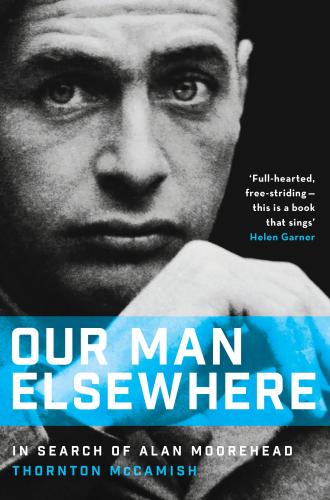Books: Our Man Elsewhere

Alab Moorehead was an Australian writer who had two periods of meteoric success but he has also had an unusually swift oblivion after his death in 1983. His first boom period was as the superstar war correspondent of the London Daily Express during World War II. He then resigned, as he wanted to become a ‘writer’ following up on the success of his 300,000- word collation of his war books African Trilogy. Ernest Hemingway had always been his model and later became a friend, and Moorehead, who may have surpassed him as a war correspondent, hoped to rival him as a fiction writer. He found he was not up to it and it took him a decade before he recaptured the winning touch with Gallipoli, The White Nile, The Blue Nile, The Fatal Impact and other books..
Thornton McCamish, who was only five when Moorehead died, later asked himself why Moorhead had such success followed by such swift oblivion, and why he wanted not only to get out of Australia but later kept travelling incessantly. Hooked after reading the memoir A Late Education, he followed in Moorehead’s footsteps which shaped the way he went about this well-written and well-produced book. He puts himself in Moorehead’s shoes imaginatively to convey what it all meant to him.
This is tricky, but McCamish’s Moorehead is enjoyable. However there are some costs: there are important omissions, for instance he does not mention the trip Moorehead made to the United States with his wife during the North African campaign, he is not recounting all the key moments in Moorehead’s life but those which impacted on his writing.
He says that Moorehead did all he could to cut himself away from Australia in the early part of his career. There is a lot to this but he did report the arrival of the Australian troops in Egypt and later requested to cover the war in the Pacific. His employers had other ideas.
The biggest shortcoming is his scanty treatment of the relations between Moorehead and his loyal, supportive and talented English wife Lucy. Moorehead was a serial womaniser which, McCamish says, created ‘a continuing misery’. This contrasts with the few other paragraphs on his domestic life and cries out for further probing.
I would have liked more on his Melbourne life as I suspect the Melbourne University History school may have contributed to Moorehead’s ability to set vivid battle scenes in a broader context which lifted his reportage to a higher level.
Moorehead came to Europe thinking it was the centre of the world but, after seeing its wartime self-destruction, found his later subjects far from it. In this phase he refound Australia and thought of returning to live there but in London in 1966 underwent a botched operation, which brought on a severe stroke. From then on he was active but unable to read or write and could only speak a few words. The ambitious, hard- working author lived imprisoned in this condition for his last 17 years, mainly at the house he had built for his family above Porto Ercole. Thirteen years after his operation he was in a car crash in which he witnessed the death of Lucy.
McCamish’s enthusiasm for Moorehead does not prevent him asking some acute questions about his restless life and about his writing which he sets excellently in its historical and especially its literary context - those years when many readers travelled through books recounting adventures.
Our Man Elsewhere: In Search of Alan Moorehead
Thornton McCamish
Black Inc.
ch-do'g



